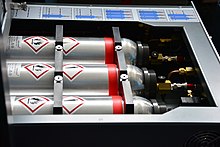Metal hydride storage
A metal hydride storage (hydride storage) is a storage for initially gaseous hydrogen .
Here, the hydrogen is stored dissolved in a metal or a metal alloy. A compound is formed from the metal and the hydrogen, the metal hydride . The hydrogen can be driven out again by lowering the pressure and adding a little heat. Promising candidates are currently, for example, the chemical compounds of magnesium hydride , lithium hydride , sodium borohydride , lithium and ammonia-borane .
Hydride storage systems are a possible storage method for hydrogen that could play a greater role in future as an energy source in mobile fuel cells in automobiles or portable computers. (Energy distribution concept of hydrogen technology )
A disadvantage of the hydride storage system is the high mass due to the massive metal filling and the relatively slow absorption and release of hydrogen; One advantage is the safety of the bound hydrogen (no high storage pressure required).
Examples of the use of a metal hydride storage system are the class 212 A submarines or the Hydra passenger boat , which could store hydrogen for two eight-hour operating days with such a storage system.
See also
- Nickel-metal hydride accumulator in which the metal hydride acts as a hydrogen donor
- Hydrogen storage
- List of hydrogen technologies
Individual evidence
- ↑ Complex hydrides as materials for hydrogen storage (MPG)
- ↑ Storage of hydrogen (PDF; 520 kB).
- ↑ Ulrich Eberle, Michael Felderhoff, Ferdi Schüth: Chemical and physical solutions for the storage of hydrogen. In: Angewandte Chemie. 121, 2009, pp. 6732-6757, doi: 10.1002 / anie.200806293 .
- ↑ Jörg Schindler, Patrick Schmidt: Fuel cell and hydrogen technologies as an economic opportunity for Hamburg ( Memento from February 3, 2013 in the Internet Archive ). LB-Systemtechnik GmbH, January 2004 (PDF; 3.5 MB).
- ↑ Hydra fuel cell boat. In: Hydrogen Projects> Mobile Applications: History. dieBrennstoffzelle.de, accessed on April 15, 2018 .
